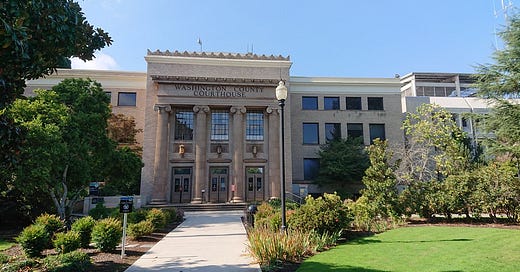What jury duty taught me about civic service
There is something powerful about putting a diverse group of people together and giving them a common goal to work toward.
Finding examples of constructive civic engagement becomes more and more difficult as our society grows increasingly polarized, which is why I want to share my recent experience as a juror.
When I received notice to report for jury duty in Washington County, my reaction was fairly typical. I knew the importance of jury duty and had served on a jury once before. But I was afraid it might interfere with other things I wanted to do. Those concerns multiplied when I arrived at the courthouse and learned I was under consideration for a murder jury that could last up to three weeks.
That was in October. Ultimately, the trial was postponed until March and I was selected for the jury. The trial only lasted five days, six if you count voir dire, but it left an impression on all the jurors. Here are my two biggest takeaways.
There is something powerful about putting a diverse group of people together and giving them a common goal to work toward.
I don’t know exactly how the 12 jurors and two alternates were selected. Unlike on television shows, the lawyers and judge don’t “accept” or “dismiss” you while you are sitting in front of them. But the selected jury was a diverse and interesting group. We had at least three engineers, two health care workers, an accountant, a retail clerk, a truck driver and me, among others. Ages ranged from early 20s to 60s. At least four ethnicities were represented and at least one juror was a naturalized citizen. We did not directly discuss politics, but it was obvious that views ranged from progressive to well right of center.
Despite the differences and the difficulty of the task – not only were the charges serious but the evidence was voluminous and complex – there never was any tension in the room. When we had disagreements on evidence, we worked through them civilly and methodically.
So why can’t the executive and legislative branches of government work this well?
Our incentive system was different from the one faced by any candidate for elected office. First, we couldn’t leave until we achieved our goal. Just as important, we had no reason to try to “outperform” any other member of the jury. It’s hard to replicate those conditions at the Capitol – in Salem or Washington, D.C.
However, perhaps we could find ways to break down partisan walls at the personal level and encourage voters to support candidates who are committed to collaboration and teamwork. Some countries require civil service by young adults – often, but not always, military service. From time to time some type of mandatory service is proposed in the United States, but the idea never goes far.
My jury experience suggests another path: two-week public service stints once every five years for all workers. As with jury duty, companies could be encouraged or required to pay workers while they are serving. If such a program were designed, it should include a requirement that service teams be diverse and as representative as possible of the overall population. The teams could be assigned to help in schools, homeless programs, public clean-up projects, any program that addresses an important societal issue.
The justice system needs to be improved but defunding isn’t the answer.
As we deliberated, jurors agreed that there were certain elements of the case where we wished we had more information. The lack of evidence in these areas did not affect our verdict. But it was clear that this case pushed law enforcement agencies to the edge of their capabilities. That’s not surprising. The murder occurred in a suburban city, whose police requested and received help from county and state law enforcement agencies as well as neighboring communities. There was a system in place to enable such cooperation on major cases.
All things considered the system seemed to work well. But the circumstances provided clear evidence that if you reduce law enforcement budgets, the cuts won’t just affect the parts of the system that trouble many citizens. Inevitably, reduced budgets also will affect the ability to investigate and prosecute major cases.
Under current funding, prosecutors and public defenders both cite significant budget and staffing shortfalls that hamper performance. They need more funding, not less. Defunding police won’t create a better justice system. It’s more likely that increased funding is needed at all levels of the system. But that funding should come with increased accountability, which is what’s really need to address recurring problems.
I’m sure given more time and reason to talk, the jurors would have found plenty of things outside the scope of the trial on which we disagreed. But we all left in agreement on one thing other than the verdict: The week-plus that we devoted to jury duty was a benefit to society and more than worth our effort – even if it was inconvenient to some.
Mark Hester worked 20 years at The Oregonian in positions including business editor & editorial writer. He currently is a communications consultant.
Photo Credit: "Washington County Courthouse (Oregon)" by lazytom is marked with CC BY-NC-SA 2.0.





You weren't able to hear relevant evidence because the court system excludes much probative, truthful information on the grounds it would be “prejudicial” to the case. The wisdom of 12 usually is better than that on one.